Murray House
Murray Road, Ottershaw, Surrey KT16 0HW
Medical dates:
Medical character:
1930 - 1984
Mental handicap
The Local Government Act, 1929, dismantled the Boards of Guardians, transferring Poor Law functions to the County Councils. In this way, the Chertsey workhouse, built in 1836, was appropriated by the Surrey County Council, who renamed it Murray House on 10th October 1930.
On 16th June 1932 the premises were handed over to the Council's Mental Hospitals Committee, and it became the Murray House Certified Institution for Mental Defectives, an annexe of the newly established Botleys Park Hospital.
The main building of the former workhouse and its infirmary were 2 storeys high. The site also contained a bungalow for 30 adult patients, a Home for 38 children, a Home for 11 older boys and a Refractory Boy's Home, as well as a Nurses' Home and a staff cottage, a garage, garden store and a mortuary.
In the mid 1930s huts were erected to accommodate a further 44 patients.
By 1939 the Institution contained 208 female patients aged over 35 years, and 2 children. At the outbreak of war some 36 adult females and 99 children were transferred from Botleys Park Hospital.
In 1948 the Institution joined the NHS along with its parent Hospital, under the control of the Botleys Park Hospital Management Committee, part of the South West Metropolitan Regional Health Authority. By this time some 79 of its nominal 300 beds were non-existent and only 221 patients could be accommodated without serious overcrowding. A further 91 beds needed repair.
Some 21 male patients were under treatment for TB.
Patients were occupied with rug-making, book-binding and painting. Gardening was also encouraged.
By 1953 two separate units - Summerfields and Grays House - had been built in the grounds to accommodate 24 high-grade patients employed outside daily by local industrial firms. The combined North and Y block opened in August 1953, but the remaining obsolete buildings needed more toilet and sanitary facilities.
In 1955 the annexe had 255 beds; the weekly cost of an in-patient was £4 13s 0d (£4.65). Redecoration was carried out of the ground floor and staircase of the Children's Home. The Nurses' Home was also redecorated and improved - with an additional bathroom and WC, and washbasins, radiators and bedside lamps installed in each room. Refrigeration was made available in all the wards and a TV was purchased for the male TB patients living in the bungalow. A large TV was installed in the central common room. Sanitary improvements were carried out throughout the site.
In 1957 the cost of an in-patient had risen to £5 12s 0d (£5.60) and, in 1961, to £7 3s 0d (£7.15). The premises had undergone considerable improvements and the patients were employed making chain-link fencing, cardboard assemblies, packing polythene bags and sheets, and making waxed paper bags. The chronic shortage of staff had been resolved by 33 new nurses and carers being hired from Spain.
In 1958 the old buildings were renovated and modernised, the heating system improved and the sanitary facilities made more adequate. The weekly cost of an in-patient was £5 11s 11d (£5.60). The TB unit contained 6 beds for male patients.
In 1961 the South Block and Children's Home were upgraded and new furniture installed. A new verandah was built onto the South Block so that the patients could be nursed in the fresh air. The bungalow ward was made available for crippled and geriatric cases, aged from 18 to 28 years. The weekly cost of an in-patient was £6 16s 9d (£6.88).
With the new policy of encouraging mentally handicapped patients to live more independently in smaller units or in their own homes, the annexe gradually was vacated.
Murray House closed in 1984.
|
Present status (May 2011) Most of the former workhouse and hospital buildings have been demolished, but the entrance block to Murray House is Grade II listed. It and the chapel survive, both having been converted to residential use by Bellway Homes. |
|---|
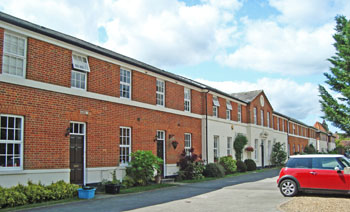
The front elevation of Murray House, built in 1836.
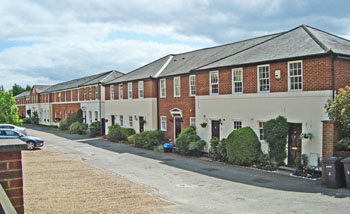
The centre and end pavilions have a stuccoed ground floor (above and below).
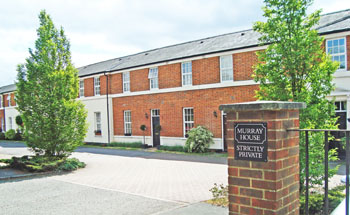
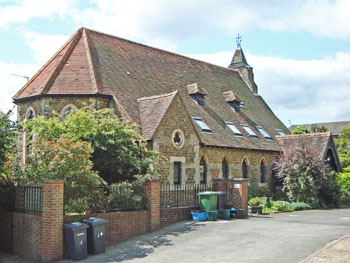
The surviving chapel (above and below).
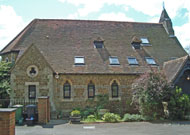
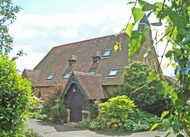
References (Accessed 24th August 2017)
http://discovery.nationalarchives.gov.uk
http://hansard.millbanksystems.com
https://langdondownmuseum.org.uk
www.britishlistedbuildings.co.uk
www.exploringsurreyspast.co.uk (1)